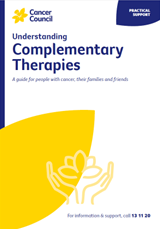- Home
- About Cancer
- Living well
- Complementary therapies
- Key questions
- Complementary therapy categories
Complementary therapy categories
Complementary therapies can be grouped into the following 4 categories. Some therapies fit into more than one category.
Mind–body practicesMind–body practices are based on the belief that what we think and feel can affect our physical and mental wellbeing.Mind–body practices may also be called psychological techniques, emotional therapies or spiritual healing. When our emotions or mental state are under pressure, our physical body can be affected. Similarly, physical symptoms can have a negative impact on our mood and mental wellbeing. Examples – art therapy, counselling, hypnotherapy, laughter yoga, meditation, mindfulness, music therapy, relaxation, spiritual practices. | |
Body-based practicesBody-based practices work directly on your body. They may also be described as bodywork or touch therapies.Some techniques are passive – therapists apply some form of touch or manual pressure to your body. Other practices require you to do a series of movements to stimulate and stretch different parts of the body. Therapies such as acupuncture, tai chi, qi gong and yoga have a strong mind–body connection, so they may benefit both physical and emotional health. Examples – acupuncture, aromatherapy, massage, qi gong, reflexology, tai chi, yoga. | |
Energy therapiesEnergy therapy is based on the belief that the body has an invisible energy field, and when this energy flow is blocked or unbalanced, you can become sick. Unblocking this energy is said to help promote healing and wellbeing.This vital energy or life force is known by different names in different whole medical systems – for example, qi in Chinese medicine and prana in Ayurvedic medicine. There is no scientific evidence of an energy field or that energy therapies have any benefits. Examples – healing touch, reiki. | |
Therapies using herbs and plantsHerbal remedies, also known as botanical medicine, have been used in many traditional medicine systems. They are produced from all parts of a plant including the roots, leaves, berries and flowers. These may contain active ingredients that may cause chemical changes in the body.Herbal remedies are often taken by mouth or applied to the skin to treat disease and promote health. There is no reliable scientific evidence that herbal remedies alone can cure or treat cancer. Examples – bush remedies, Chinese herbal medicine, flower remedies, medicinal cannabis, Western herbal medicine. |
→ READ MORE: Safety concerns about complementary therapies
Meditation and Relaxation Podcast
Listen to more of our meditation and relaxation podcast for people affected by cancer
More resources
Dr David Joske, Clinical Haematologist, Sir Charles Gairdner Hospital and PathWest, Chairman and Founder Solaris Cancer Care Foundation, Clinical Professor of Medicine, The University of Western Australia, WA; Australasian Integrative Medicine Association (AIMA); Dr Robert Blum, Clinical Director, Cancer Services, Bendigo Health, NSW; Sally Brooks, Senior Pharmacist, Medicines Information, Peter MacCallum Cancer Centre, VIC; Dr Suzanne Grant, Senior Research Fellow, NICM Health Research Institute, Western Sydney University, and Chris O’Brien Lifehouse, NSW; Prof Danforn Lim, Adjunct Professor and Advisory Board Member, NICM Health Research Institute, Western Sydney University, and Adjunct Professor, UTS, NSW; Christina Line, Statewide Services Senior Coordinator, Cancer Council WA; Jen McKenzie, Physiotherapist (Lymphoedema) and ESSA Accredited Exercise Physiologist, The McKenzie Clinic, QLD; Simone Noelker, Wellness Centre and Pastoral Care Manager, Ballarat Regional Integrated Cancer Centre, VIC; Dr Nirzari Pandit, General Practitioner, RACGP Specific Interests Integrative Medicine Group, NSW; Georgie Pearson, Consumer; Cris Pirone, Counsellor, Cancer Council SA; Dr Elysia Thornton-Benko, Specialist General Practitioner, and UNSW Research Fellow, NSW; Kirsty Trebilcock, 13 11 20 Consultant, Cancer Council SA.
View the Cancer Council NSW editorial policy.
View all publications or call 13 11 20 for free printed copies.

